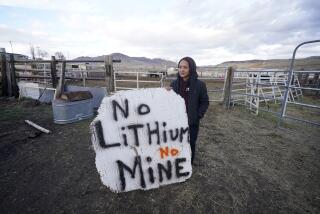Congress Fails in 1872 Mining Law Overhaul
WASHINGTON — Lawmakers abandoned efforts Thursday to overhaul a 122-year-old mining law that critics have called a taxpayer rip-off because it allows the purchase of mining claims for as little as $2.50 an acre.
Sen. J. Bennett Johnston (D-La.) said he no longer has hopes for a bill acceptable to mining interests and Western senators who in the closing days of Congress can block legislation if they choose.
Johnston said he had gained the support of a major mining company, American Barrick, in his latest attempt at working out a compromise but then “the industry got into motion . . . and put tremendous pressure” on Barrick.
Rep. George Miller (D-Martinez), who led House negotiators, accused the mining companies of stonewalling and pressuring Western senators into opposing whatever bill came out of the discussions.
Jack Gerard, a spokesman for the Mineral Resources Alliance that represents the hardrock mining industry, said the mining companies wanted a reform law this year but were not prepared to accept some of the provisions in the legislation being discussed.
Johnston and Miller had been locked in talks over several months in an attempt to work out a compromise after the House and Senate passed significantly different bills aimed at ending abuses under the 1872 mining law.
The law, enacted at a time when government wanted to promote development of Western natural resources, allows individuals or mining companies to take ownership of a hardrock mining claim on federal land for as little as $2.50 an acre and pay no royalties on minerals taken from the land.
The House and Senate bills would have required payment of market value for land under the 1872 law and, for the first time, would have required payment of a royalty.
But the mining companies let it be known they would accept no more than a 3% royalty and had trouble with other parts of the compromise, including giving the Interior Department greater authority.
More to Read
Sign up for Essential California
The most important California stories and recommendations in your inbox every morning.
You may occasionally receive promotional content from the Los Angeles Times.










